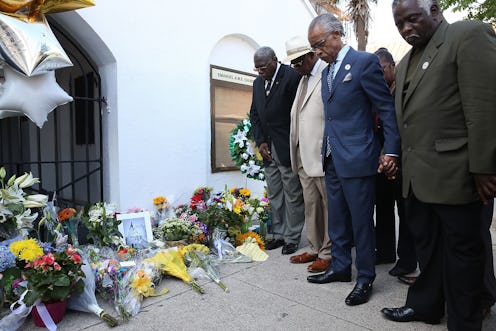News
Charleston Slaying Makes Juneteenth More Poignant
On Saturday, many in the black community will celebrate the 150th anniversary of the end of slavery in America. It’s a holiday known as Juneteenth, named for June 19th, 1865, the day the last enslaved Africans learned that slavery had ended. The holiday also represents an end to religious persecution and the practice of black Americans having to worship in secret or face acts of terrorism by white supremacists. After Wednesday night’s attack, members of the Charleston Emanuel Church community must be wondering how far we’ve actually come in 150 years.
First, a bit of history: It’s true that Abraham Lincoln freed all the slaves in the U.S. when he signed the Emancipation Proclamation in 1863. The historical record is a bit more murky on why it took over two years for all blacks to hear that slavery had ended. Certainly, plantation owners would have had a real motive to keep the truth a secret for as long as possible. Some historians even argue that the delay was a plot between the Confederacy and the Union to get the cash-strapped South through another cotton harvest.
Either way, on June 19, 1865, enslaved Africans on Galveston Island in Texas got the word that slavery was over. According to the official website, Juneteenth is now celebrated in 43 states across the U.S., including South Carolina.
The Charleston Emanuel Church is an important part of the Juneteenth story. The church itself was founded in the 1800s as a safe haven for worshippers fleeing racism, a place where services had to be held in secret in order to get around laws that banned all-black convenings.
The church remained at the center of the civil rights movement for more than 200 years, right up to this April when North Charleston erupted after an unarmed black man was shot in the back by a local police officer following a traffic stop. After the Walter Scott shooting, Reverend Clementa Pinckney was one of the state’s strongest advocates for more police accountability and solidarity among faith leaders. Local pastor Rev. Robert E. Kennedy told the Washington Post that Emanuel Church and Rev. Pinckney were instrumental in keeping the community focused on achieving justice:
He brought us together, the Methodist bishops, to address the problem of gun violence in light of Walter Scott. It was all him.
As part of that work, Pinckney made a statement from the Senate floor last May that his death this week has only made more poignant:
Today, the nation looks at South Carolina and is looking at us to see if we will rise to be the body and to be the state that we really say that we are.
By now, the whole world has seen the face of the leading suspect behind the violent attack Wednesday night that left nine people dead at Emanuel AME. Now that the police have taken suspect Dylann Storm Roof into custody, attention will no doubt turn to the motives behind Roof’s alleged actions. Law enforcement officials agree that Roof’s actions were fueled by racialized hatred, and those who claim to know the suspect well have already begun coming forward with additional insight into his motives, including Roof’s alleged interest in starting another civil war.
No doubt, the rich legacy of the Emanuel African Methodist Episcopal Church and its place in black history were not lost on Roof. And on the eve of Juneteenth, his crimes should be a call to arms for those who would fight racism and hate in the U. S.
